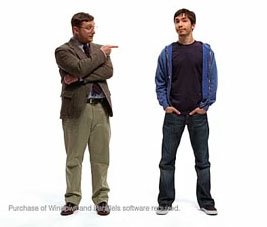Like a Tiger, Baby!
 Tiger is on the prowl again.
Tiger is on the prowl again.
After an arduous 28 months of reconstructing his swing with new coach, Hank Haney, it appears he has his groove back and is ready to begin devouring fields of competition once again. This weekend's PGA Championship win, his 12th major win, distinguishing himself as #2 all-time for major victories, was a nearly flawless display of skill and fortitude. Where the 2006 British Open victory welcomed him back, this win asserted his dominance. With machine-like execution and ironclad focus, Tiger was unflappable and indefatigable in pursuit of the Wanamaker Trophy. His near record-setting performance (he was one stroke over the course record for a round) left his opponents in awe and feeling significantly inferior. As he has discussed in the past, he possesses the uncanny ability to focus on the current shot, blocking out everything else and possessing absolutely no short-term memory. It is clear that someone else needs to master this discipline if they expect to compete in the future. Otherwise, Tiger is wholly untouchable.
The fans and sport itself can relish the drama that is sure to unfold as Tiger now sets his sights on Jack Nicklaus' record of 18 major victories. If he achieves such a lofty height, only one question will remain--how great is this champion?
A Note to Travelers
 Like the mercury in August, the nation's security threat level is rising again after a long period of stability. This morning's foiled terror plot gave new impetus for Homeland Security Director, Michael Chertoff, to raise the threat level to its highest level (severe) for flights originating in the UK and bound for the U.S. Congruently, all commercial aviation in or destined for the U.S. are on high alert. We should be grateful for the measures our government and the UK's government have taken to maintain our security. They are to be lauded for their accomplishments and our continued safety.
Like the mercury in August, the nation's security threat level is rising again after a long period of stability. This morning's foiled terror plot gave new impetus for Homeland Security Director, Michael Chertoff, to raise the threat level to its highest level (severe) for flights originating in the UK and bound for the U.S. Congruently, all commercial aviation in or destined for the U.S. are on high alert. We should be grateful for the measures our government and the UK's government have taken to maintain our security. They are to be lauded for their accomplishments and our continued safety.
So, what does all of this mean for the average American traveler? Beyond today's headaches of cancelled flights, long delays, and lengthy security queues, it has one most noticeable effect--an additional inconvenience at security checkpoints. The prohibition of liquids and gels in all carry-on luggage is bound to be a pain for ignorant or forgetful travelers and a boon for TSA storage bins. Like the ever-expanding world of legislation, the list of prohibited items and practices for air travel is burgeoning without an end in sight. Whenever some terrorist does his best MacGyver impression (think Richard Reid ala December 2001), millions of travelers are forced to perform some concocti on of seemingly strange behaviors, like removing their shoes, belts, laptops, etc. Modern advancements like GE's EntryScan systems might enable us to keep our shoes on in the future, but there is no assurance the list of security screening activities won't grow to anything short of a full-body cavity search at some point in time. And similar to legislation, once a procedure is put into practice, it is rarely reviewed for necessity or rescinded in the future. If you don't believe me, take a quick look at U.S. legal code and note the antiquated nature of a myriad of laws still on the books.
on of seemingly strange behaviors, like removing their shoes, belts, laptops, etc. Modern advancements like GE's EntryScan systems might enable us to keep our shoes on in the future, but there is no assurance the list of security screening activities won't grow to anything short of a full-body cavity search at some point in time. And similar to legislation, once a procedure is put into practice, it is rarely reviewed for necessity or rescinded in the future. If you don't believe me, take a quick look at U.S. legal code and note the antiquated nature of a myriad of laws still on the books.
Given the nature of the terrorism prevented, the inconvenience is certainly warranted and welcomed. A simple cost/benefit analysis is all one needs to justify jumping through a few simple hoops in order to prevent the loss of lives. However, travelers like myself who are always cutting flight time close, need to be especially diligent the next time we fly. Certainly not a bad idea, but not necessarily an easy one for a procrastinator!
Young, hip social networker, meet stodgy, traditional Banker.
 First, the creatively cool Mac and traditionally dull PC got together. Now, the trend continues.
First, the creatively cool Mac and traditionally dull PC got together. Now, the trend continues.
Almost as if they read it off the blog, Citigroup (the nation's 35th largest advertiser) struck a deal with MySpace today to begin advertising on the site. Details are still forthcoming, but it nonetheless proves significant. The shift to digital ads is picking up steam as its anticipated other large advertisers will follow suit.
In case you were looking for an additional resource to view the Information Revolution, paidContent.org is a useful site for tracking the business media and content.
X + Y = Δ
 How are Generations X & Y changing the consumer landscape? To start with, they are living in new ways via the Internet. They shop, network, research, download, learn, blog, entertain and express themselves online. As a result, large traditional retail outlets are losing market share to the nimble and niche players in the online universe. And amazingly, this is just the beginning of the Information Revolution.
How are Generations X & Y changing the consumer landscape? To start with, they are living in new ways via the Internet. They shop, network, research, download, learn, blog, entertain and express themselves online. As a result, large traditional retail outlets are losing market share to the nimble and niche players in the online universe. And amazingly, this is just the beginning of the Information Revolution.
As the Internet has become a new portal for X'ers and today's teens to extend and integrate their lives, companies are scurrying to find creative ways to reach them as traditional means of marketing and advertising are losing their effectiveness. Rupert Murdoch (chairman of News Corp.), Hollywood, MTV (via MTV Flux), and a myriad of marketing firms are courting (or buying in Murdoch's case) online social networking sites like MySpace, YouTube, and FaceBook. In fact, both CNN and the Financial Times ran pieces on the courtship today.
Wired's Chris Anderson has written about this shift in his new book, "The Long Tail: Why the Future of Business is Selling Less of More." While I have yet to read the book, comments from him in various interviews recently as well as on his blog indicate Anderson may be a leading thinker on the edge of this phenomenon. Certainly his time spent in China with The Economist and his current gig with Wired afford him a unique perch to view the evolution. His interview on Charlie Rose last night was particularly insightful (see it here). In some ways, he appears to be Generation X & Y's own Thomas Friedman--hip, culturally relevant, technologically savvy, well informed on the issues affecting these groups, and on the cutting edge of envisioning the future. His main thesis: the future world will not be made up of a few large, centralized distributors. Rather, it will contain numerous decentralized, niche groups who are defined by the segmented audiences who support them. If you follow Friedman's democratization theses, Anderson's argument seems plausible. The Internet's low cost of entry has shifted power from megapowers with the most money in their coffers to quite literally anyone who desires to have a presence. No longer does one need the capital, infrastructure, and distribution channels big media once controlled. If you want to publish or act like a journalist, use Blogger. Want to produce movies and TV shows? Use YouTube. Want distribution for your music? MySpace. All these services are a one-stop shop for your respective needs. Best of all, they are FREE to use and therefore, fully accessible to anyone with an Internet connection! To quote Friedman, "The world is (now) flat."
If nothing else, it's some food for thought as the future unfolds. Sit back and enjoy the show. It's becoming more fascinating with each advancement.
Say It Ain't So!
 I know I've been traveling quite a bit recently, but somehow I missed the headline that the United States abandoned the Constitution's clauses regarding civil liberty, choosing instead to adopt socialist policies.
I know I've been traveling quite a bit recently, but somehow I missed the headline that the United States abandoned the Constitution's clauses regarding civil liberty, choosing instead to adopt socialist policies.
Over the weekend, CNN told the story of a cancer-ridden teenager fighting for his life. In his quest for survival, he started using alternative treatments, such as a sugar-free, organic diet and herbal supplements since three months of chemotherapy previously undergone made him nauseated and weak. Amazingly, Virginia Social Services intervened and charged his parents with neglect for allowing him to cease "approved" methods (ie. chemotherapy). Meanwhile, they seized custody of the boy. Who knows if they are now forcing him to undergo involuntary chemotherapy treatments. It remains baffling as to how our government--one founded supremely on individual liberty--could not only allow this action to take place, but to support it judiciously. Disgusting.
Someone sound the alarm. Lady Liberty wave your torch. The Marxists have invaded!
Easy Living
 CNN Money Magazine recently released their annual rankings on the "Best Places to Live" for 2006. These lists are always interesting as it is often hard to decipher its author's criteria and biases in ranking places. Nonetheless, they often seem realistically close in their accuracy.
CNN Money Magazine recently released their annual rankings on the "Best Places to Live" for 2006. These lists are always interesting as it is often hard to decipher its author's criteria and biases in ranking places. Nonetheless, they often seem realistically close in their accuracy.
The "Best Places" rankings segment various categories, such as big cities, safest communities, most educated, job growth, etc. In the "Best Big Cities" category, many of the assumed favorites made the top 10--San Diego, Colorado Springs, Austin, New York. But, one in particular caught my eye--the number 8 choice. You guessed it, the one and only, Columbus, OH.
Columbus should feel good for receiving the national recognition. It has worked hard to continuously develop and adapt to regional and economic changes. It is consistently on the forefront in many categories--consumer behavior, service-sector growth, research advancements, and value mindsets of the American majority. The diversity it offers while increasing the economic value to its citizens and maintaining relevancy as compared with its peers is admirable. While the statistics listed in the rankings show clear room for improvement, the task is attainable given the city's continued evolution. Additionally, significant change in fiscal, legislative, and economic policies under new statewide leadership has the opportunity to propel it further ahead.
Admittedly, there are many other places on the list that I would prefer to live at some point (Austin, Colorado, San Diego, Raleigh, Scottsdale, NYC, Chicago, Florida, etc.). However, it is good to know that residency here has its benefits and isn't penalizing one's development. And did you know that half of the U.S. population lives within 600 miles of Columbus? Wow, what great opportunity.
Three cheers for Columbus for continuing to move up in the world!
Back in the Blogosphere!
 Well, it finally happened. Three weeks and two days after business and personal travel took me to or through nine states, I am finally back in Columbus and ready to get back to blogging, among other regular activities. Believe it or not, this is day six for me in Columbus during the month of July. Phew!
Well, it finally happened. Three weeks and two days after business and personal travel took me to or through nine states, I am finally back in Columbus and ready to get back to blogging, among other regular activities. Believe it or not, this is day six for me in Columbus during the month of July. Phew!
Certainly, much has happened in the world during this time despite my decreased focus on its events. I look forward to dissecting and discussing some of these activities in the next few posts. For now, it just feels good to be back!
Sign of the Times
 The economic recovery in recent years has allowed the rich to get fantastically richer, but an interesting article from the Financial Times today shows the typically poor, third-world continents are not being left out either. In fact, they are leading the increase (on a percentage basis) of high net worth individuals (people with liquid assets >$1m), with Africa reporting nearly 12% growth and the Middle East and Latin America nearly 10%. The catalyst behind this surge can be attributed mainly to the commodity bull run that began in 2003 and is expected to continue throughout the next 10-15 years. With greater demands for metals, energy, and other key resources, countries rich in natural resources stand to continue to benefit significantly. As giants like China and India seek to meet new demand by courting tiny countries with untapped resources, it's raining money in countries like Ghana, the Ivory Coast, Angola, Morocco, and Uganda--countries normally accustomed to financial drought. When you add in the Latin American and Middle East countries surfing the commodity wave, an interesting picture develops. Governments typically known for instability, coups, corruption, and inefficiency are now benefactors of the developed nations' current productivity boom.
The economic recovery in recent years has allowed the rich to get fantastically richer, but an interesting article from the Financial Times today shows the typically poor, third-world continents are not being left out either. In fact, they are leading the increase (on a percentage basis) of high net worth individuals (people with liquid assets >$1m), with Africa reporting nearly 12% growth and the Middle East and Latin America nearly 10%. The catalyst behind this surge can be attributed mainly to the commodity bull run that began in 2003 and is expected to continue throughout the next 10-15 years. With greater demands for metals, energy, and other key resources, countries rich in natural resources stand to continue to benefit significantly. As giants like China and India seek to meet new demand by courting tiny countries with untapped resources, it's raining money in countries like Ghana, the Ivory Coast, Angola, Morocco, and Uganda--countries normally accustomed to financial drought. When you add in the Latin American and Middle East countries surfing the commodity wave, an interesting picture develops. Governments typically known for instability, coups, corruption, and inefficiency are now benefactors of the developed nations' current productivity boom.
The question becomes: What do these governments' leaders do with all their newfound capital? Pure and simple, they seek to assert their new power. We're starting to get a glimpse of this in Latin America. Venezuela's revolutionary Chavez is doing his best Robin Hood impression as he popularizes himself among South America's underprivileged, while socializing his country and making influential alliances. His radical stances are being well received by many in the region seeking change while bristling the nerves of the U.S. and its allies. Other regional leaders are beginning to catch on as well. Bolivia is making the shortsighted mistake of nationalizing industries and Peru was dangerously close to electing an ally of Chavez last month. As money continues to pour in and power begins to shift, the arms and alliances will only continue to accumulate. While the dynamics are different in the Middle East and Africa, the evolution will be intriguing and necessary to watch.
The fact that these trends are just beginning combined with the other major geopolitical changes taking place (globalization, the information revolution, a U.S. war in the Middle East, and the rise of new superpowers) make this period in history uniquely interesting.
W stands for Winner
 This year's playoffs gave the media, fans, and teams plenty to talk about. Substantiated or not, controversy surrounding fouls, favoritism, suspensions, fines, and emotional owners all played a part in one of the more exciting NBA Finals in recent memory. The combination of this controversy and various players' competitive performances brought new and old fans back, which is great for the league. Finally, the NBA is exciting again.
This year's playoffs gave the media, fans, and teams plenty to talk about. Substantiated or not, controversy surrounding fouls, favoritism, suspensions, fines, and emotional owners all played a part in one of the more exciting NBA Finals in recent memory. The combination of this controversy and various players' competitive performances brought new and old fans back, which is great for the league. Finally, the NBA is exciting again.
These Finals were really a debut of two things:
1. The Mavericks -- they are young, but have the passion, talent, and teamwork to be great. Their cohesion and Mark Cuban's unique ownership ability will ensure that they are a force to be reckoned with in the coming years.
2. Dwyane Wade -- without question, he was the best player on the court when it mattered most. He dominated the playoffs and was the easy choice for MVP of the champs. No one stepped up as big and as consistently as he did, especially at the crucial moments. His Finals stat line is off the charts (34.7 ppg, 7.83 rpg, 3.8 apg) and one of the best for a Finals first-timer. The fact that he is only 2 years into the league is even more remarkable. Like the two other stars of his draft class (Lebron and Carmello), he has greatness written all over him.
Love 'em or hate 'em, the Heat persevered and earned the trophy, thanks mostly to their gritty warrior who wears #3. He was flat-out impressive.
The Inaugural Post
 Welcome one and all to The Atmosphere--a documenting source for the surrounding influences of our current evolution. I look forward to the exchange of ideas presented here and the overall enjoyment & guidance they bring.
Welcome one and all to The Atmosphere--a documenting source for the surrounding influences of our current evolution. I look forward to the exchange of ideas presented here and the overall enjoyment & guidance they bring.
I'll do my best to regularly share my thoughts and happenings. Your contributions are always welcome.
Ciao!
 Tiger is on the prowl again.
Tiger is on the prowl again.









